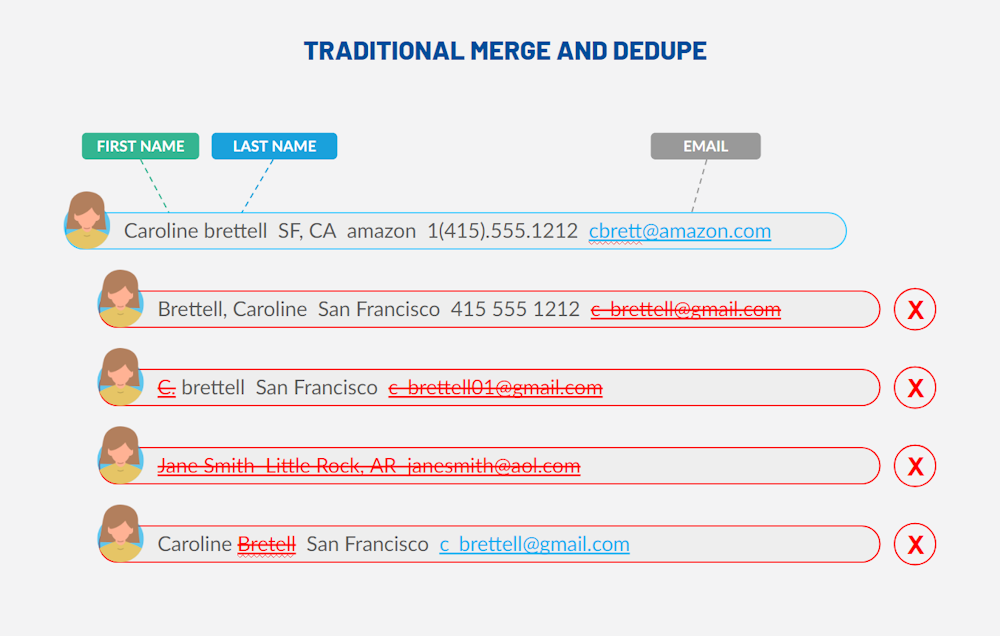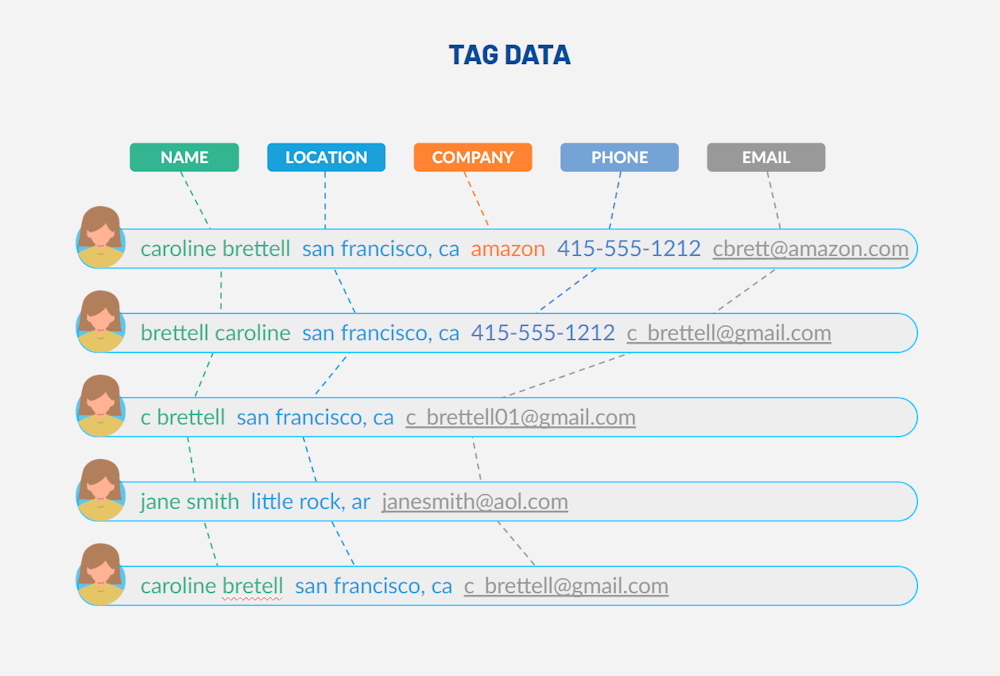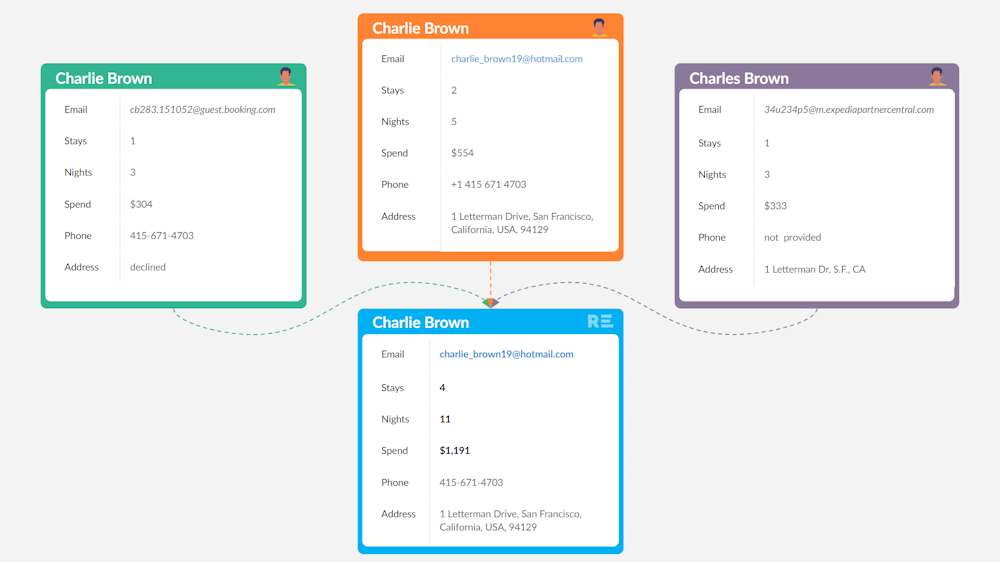The hotelier’s guide to identity resolution
 A potential guest planning a trip explores your hotel’s mobile site for available rooms. She clicks on a special offer to download your hotel app for an exclusive direct-booking deal but then gets sidetracked with other plans. Later, she visits your website on her laptop to finalize her booking. The next day, she uses the mobile app to complete her reservation.
A potential guest planning a trip explores your hotel’s mobile site for available rooms. She clicks on a special offer to download your hotel app for an exclusive direct-booking deal but then gets sidetracked with other plans. Later, she visits your website on her laptop to finalize her booking. The next day, she uses the mobile app to complete her reservation.
Fast forward several months, and she stumbles across one of your Instagram ads showcasing your tempting spa services at another property. She impulsively books a stay and a massage without ever leaving the app.
This type of disparate, multi-channel customer journey is increasingly common today. In fact, Maury Lundahl, VP of Marketing for Extended Stay America, recently stated that the average consumer has 42 digital touchpoints before booking. The result of all these touchpoints is that a unique customer profile is created with each interaction — causing inconsistent and duplicate data to live in your systems, often across multiple properties.
The challenge for hoteliers lies in tracking these myriad interactions, unifying them into a single guest profile, and leveraging this data to create tailored experiences and targeted marketing.
This is where the power of identity resolution comes into play.
What you will see here
- What is identity resolution
- Why identity resolution is important for hotels
- How identity resolution works
- How to implement identity resolution
What is identity resolution
Identity resolution is the process of pulling together all the individual threads of a customer’s interactions across different devices and channels, and weaving them together into one cohesive, 360-degree guest profile. It involves sophisticated techniques such as tagging users across platforms based on personally identifiable information (PII), and connecting digital identifiers from the various devices each customer uses.
PII is information that, when used alone, can directly identify an individual. Examples include:
- Name
- Driver’s license number
- Physical address
- Email address
- Phone number
- Passport information
Digital identifiers are created when a guest interacts with your hotel online, such as through your website, mobile app, and social media. Examples of digital identifiers include:
- IP address and device IDs
- Shopping behavior
- Room preferences
- First-party data
Hotels need both types of information to create truly comprehensive guest profiles. Many platforms claim to have the functionality to accomplish this, however, the reality is that their backend processes are both basic and flawed.
Types of identity resolution: deterministic and probabilistic
They typically rely solely on either a “probabilistic” or “deterministic” method to clean and compile your guests’ data.
The deterministic approach, often called key-field matching, uses PII to precisely match and unify customer data. For example, if an email address matches exactly between two profiles, they’re merged. The problem with this method for hotels is that it falls short when handling masked online travel agency (OTA) emails, multiple email addresses for an individual guest, or when dealing with incomplete data and unidentified customer interactions.
Key-field matching is where most CRMs stop with their identity resolution models. And unfortuntately, it’s just not enough for most hoteliers to have an accurate view of their guests.
A probabilistic approach uses predictive algorithms and patterns to link data points without explicit identifiers. It bridges gaps by inferring connections based on behavior. However, it can be less precise than deterministic methods, potentially leading to inaccuracies or mismatches in customer data association if the algorithm doesn’t have a high enough threshold for determining a likely match.
Producing a unified view of each guest is a complex science that goes a step beyond a purely deterministic or probabilistic approach. Revinate’s Advanced Profile Synthesis technology combines the best of both worlds. The solution uses artificial intelligence (AI) and advanced machine learning (ML) algorithms trained on hospitality data to automate the process of sorting, properly cleansing, and deduplicating PII and digital identifiers to give hoteliers a single, holistic, portfolio-wide profile of each guest.
Why identity resolution is important for hotels
Identity resolution is the cornerstone of an effective hotel data strategy, and it’s an element that benefits your entire organization, from marketing to guest-facing staff to privacy compliance.
Empower accurate segmentation
With fragmented data, you can’t easily identify your highest-value customers, and your email segments won’t accurately reflect guest behavior. Even if your intentions are to run a proactive, customized approach to guest engagement and promotions, when your data is faulty, you remain in the dark. You experience reduced ROI, sacrificing margins due to lower campaign conversion rates.
Key benefit: Higher conversion rates
Accurate identity resolution empowers proper segmentation, allowing you to offer the right service to the right guest at the right time. It leads to higher open rates and better conversions, because the more you know your guests, the more relevant your offers can be. As an illustration, we analyzed one-time promotional emails sent from Revinate customers to their guests. The results show that targeted campaigns sent to fewer than 5,000 recipients are opened 2x more than campaigns with broad messaging sent to 50,000 recipients. Even more impressive is the fact that segmented audiences have 5x the conversion rate of those sent to larger audiences.
Conquer duplicate data
A key issue hotels grapple with is the challenge of duplicate profiles. These often stem from human error, such as a typo when inputting an email address, or a last name change from a recent marriage, or a booking made with a nickname vs. a full name that was used on a previous stay. The resultant duplicate profiles hinder your marketing and personalization efforts.
Key benefit: Precision marketing and personalization
Identity resolution merges and reconciles multiple identifiers associated with each guest, thereby eliminating duplicate profiles and enabling precise targeting for marketing initiatives. It also enables your teams to craft highly customized experiences, perks and personalized offers, driving 40 percent higher revenue and boosting retention rates. Hoteliers can also more easily understand their most loyal guests, understand their booking habits, and create data-driven marketing strategies.
Unmask OTA emails and anonymous visitors
Masked OTA email addresses are another major cause of duplicate profiles. Of the one milllion-plus duplicate profiles we’ve merged, over 75% of them have had two or more OTA emails and real email already at a property; and an additional 12% have four or more emails from an OTA. This means you have repeat guests who are loyal to your property but not the booking channel. You need to be able to identify these customers as well as anonymous website browsers.
Key benefit: Boost customer loyalty
Accurate identity resolution with Advanced Profile Synthesis unmasks those frustrating OTA emails. In fact, we’ve merged over 1 million profiles with opaque OTA emails. In addition, the solution sheds light on anonymous website visitors, allowing you to connect them with known guest profiles. Moreover, AI/ML-powered identity resolution provides a clear understanding of guest preferences, behaviors, and histories. This allows you to create consistent customer experiences and personalized interactions that forge deeper emotional connections, driving greater loyalty and brand advocacy.
Cleanse dirty data
Because your customer information is scattered across different records, you often end up with what’s known as “dirty data.” Duplicate data mentioned above is one form of dirty data. But there are many others that you also deal with, including incomplete, inaccurate, inconsistent, and outdated data. This puts your business in jeopardy, because data impacts your most profitable path to revenue: direct bookings.
A lack of clean data often leads hotels to take the “safe” route, blasting guests with broad marketing messages that offer universal on-property experiences. But you’re only appealing to a portion of your guests — and it’s likely that you will miss the mark for many of them.
Key benefit: Increases revenue with direct bookings
The Advanced Profile Synthesis in Revinate’s Customer Data Platform cleans up dirty data by merging and matching disparate guest information from multiple sources. It reconciles conflicting data to create an accurate customer record. And it allows you to deliver compelling reasons to book directly, such as tailored experiences and discounts, and special perks like late checkout and free cancelation. Best of all, Advanced Profile Synthesis automates guest data integrity processes, saving countless hotel staff hours manually comparing and merging guest profiles.
More direct bookings mean higher revenues. In fact, hotels using Revinate’s Advanced Profile Synthesis see a 22% lift in average stay per account from unified guest profiles.
Help ensure privacy compliance
Hotel identity resolution technology plays a pivotal role in navigating evolving privacy initiatives, such as GDPR and CCPA. Customer privacy can be compromised if guest profiles are not merged accurately.
Key benefit: Build guest trust
Revinate’s robust Customer Data Platform (CDP) and Advanced Profile Synthesis solutions ensure up-to-date customer profiles that include details on individual privacy information. Together, these innovations employ sophisticated algorithms and data encryption methods that ensure guest information remains secure and anonymized, adhering to privacy guidelines. They allow hotels to effortlessly uphold compliance, build guest trust, and deliver tailored experiences without compromising individual privacy.
How identity resolution works
When you look at your PMS data, you can see what room(s) a guest booked over specific dates. However, you likely cannot see whether that guest ever stayed at a different property in your hospitality group.
And if you’re using a survey tool, you can collect guest feedback and respond to reviews over a current stay, but you’ll have no real insight into their stay history. Your email marketing platform will let you know whether a guest opens or clicks on your promotions, but you’ll have no way of knowing if they visited your physical location or engaged with your brand in any other way offline.
Integrating these different data sources with identity resolution provides a more comprehensive understanding of guest behavior and preferences, allowing for a more personalized and holistic approach to guest experience management.
But how do you get from here to there?
Revinate’s Advanced Profile Synthesis
Many companies promise to handle identity resolution for you, but their technology extends only as far as evaluating similar names and emails. They use industry-agnositc CDPs that primarily focus on web browsing data. While this approach begins to address the problem, it doesn’t address hospitality-specific issues. It ignores the majority of your fragmented and duplicate profiles which are impacted by OTA-masked emails, typos, marital name changes, and other real-life issues.
Revinate’s Advanced Profile Synthesis has been trained on hospitality data, such as that from your PMS and Revinate Marketing CRM platforms. As such, Advanced Profile Synthesis can account for more complex nuances that can make hospitality data difficult to consolidate and cleanse, and it’s proven to deliver more clean, comprehensive profiles than the competition.
The Revinate approach: The advanced ML and AI powering Revinate’s Advanced Profile Synthesis is built from the ground up to support data complexities that exist across hotel portfolios, and it is designed to be the most context-aware identity resolution on the market.
While data scientists agree that the most grueling part of machine learning is data preparation, Revinate has designed a three-step process to address the challenge of connecting disparate platforms and data variations no matter how many systems, properties, or typos are involved. Within that process, Revinate is able to leverage AI and ML to solve for a laundry list of challenges that traditionally block our competitors from effectively matching profiles, including:
- Email addresses that are masked by OTAs (e.g. 34u234p5@m.expediapartnercentral.com)
- Typos (most commonly found in email addresses)
- Name changes (from maiden to married and sometimes back again)
- Misaligned fields (the right text in the wrong field – Last Name text in the First Name field)
- Faulty text (abnormal text that is not applicable to its field – “Blank” in a First Name field)
- Phone numbers (different numbers across separate profiles)
The result: Smart, single-view profiles that tell comprehensive stories you can leverage to make real decisions. In fact, a test we ran to compare the traditional synthesis process to Revinate’s advanced AI/ML process produced the following results:
- Hotel group database: Revinate delivered 174.9% more merged profiles
- Single property database: Revinate delivered 120.6% more merged profiles
Read on for a detailed rundown of each step we use to overcome the complexities of data synthesis and automate the process on your behalf.
Revinate’s unique three-step process
Step 1: Standardization
The first step to making data useful is standardizing it. Before we can do anything with your data, we have to make sure it is the same across each of your data sources.
Using Natural Language Processing (NLP) techniques, our technology cleans, normalizes, and tags the data, making it possible to compare profiles effectively. For example, the address “123 W. Elm St.” is normalized to “123 WEST ELM STREET” across all profiles, which allows us to match it to a similar profile where “West” was originally spelled out. Similarly, the phone number “001-(333)—444-5678 is trimmed to “3334445678” so that the algorithm doesn’t get caught up on unique characters in phone formatting and can focus solely on matching the numbers themselves.
As part of this data cleanup, we identify and label common faulty values like “Not Available” “Null” “Declined” “Blank” and more specific spam values like the phone number “555-555-5555” or the email address “noreply@abc.com,” while also using machine learning to understand whether the value given is accurate. Our tech can accurately identify these common faulty values and remove them to improve the quality of the data.
Once the normalization process is complete, each record is standardized and thus able to be compared to one another accurately.
While Revinate’s algorithm looks at home address, phone number, gender, customer type, company, title, and other fields, most platforms traditionally use black-and-white merge logic matching names and emails, which is incredibly limiting. In the visual below, you can see that none of these profiles would be merged with the key-field matching technique, although to the human eye, it’s clear that four of them are, in fact, the same person.

To avoid this mistake, Revinate’s technology tags each field after normalizing the data in order to produce more logical conclusions and effectively match profiles.

Step 2: Clustering (unsupervised learning algorithm)
Now that we have standardized data, we’re able to compare guest records. While we can compare records to one another, this is a laborious process (both in terms of computational power and time) and thus grossly inefficient. Instead, we use a process that puts similar records, based on the now-standardized characteristics, into clusters of similar profiles.

We compare these record subsets using various distance algorithms and auxiliary techniques, such as our nickname database and phonetics library, to find pairwise columnar distance between two records. Pairwise columnar distance compares each characteristic (letter or numeral) of each field based on the difference between each string. With these comparisons, text order is not a limiting factor, which means that records where the last name is entered first (Smith, John) can easily be compared to those records with the first name first (John Smith).
Each field is measured in this way, producing a number of distance measures that can be used to compare records and decide whether they are close (in other words, related) or not. The collection of these measures of distance becomes a vector, which is sent to our final matching algorithm in the third and final step. This way, when we compare records, we compare them to smaller subsets of similar records.
String comparison
Comparing strings is the process of analyzing and outputting the differences or similarities between two strings, or linear sequences of characters, words, or other data. Revinate compares these distances using multiple measures including Affine Gap distance, Jaccard Distance, and Phonetics distance. For example, you might compare the names on two different guest records to see how closely they match. John and Johnny are close. John and Matt are not.
But not all fields are created equal, so in order to enhance our AI/ML process with more human-like observations, we create rules that assign specific weights to each field and adjust those weights under known circumstances. This dynamic valuation allows us to be more precise in our matching by cutting down on the weight of values that may produce erroneous results.
Two direct examples are names and OTA emails. Names are strong indicators of a profile match, but not every name should carry equal weight. Consider the following: Because the name Michael appears frequently in guest databases, it will receive a lower value than a more unique name, such as Eustace. Ultimately, this reduces the amount of noise going into the learning algorithm and prevents any issues with merging everyone with the name of John Smith in the database into a single profile.
Similarly, we are able to dynamically value email addresses. For example, many OTAs provide masked email addresses to you, resulting in temporary email addresses that are not the user’s true email address. In Revinate, these masked or junk email addresses are given a lower value, ensuring that the email in the merged profile is the correct one.
In more unique scenarios, our algorithm observes patterns in your database specifically and leverages them to improve its field weighting. For example, if bookings taken via phone often include the hotel’s address in place of a unique guest address (maybed employees are entering false data for the sake of completing a form, for example), our system recognizes that pattern and puts less weight on that specific address, as we don’t think it legitimately belongs in the guest’s profile.
We also take into consideration complex real-world scenarios like name changes. For situations like this, we adjust field weighting around things like the fact that women are more likely to change their last names when they get married. As a result, our algorithm considers the following rule:
IF contact is female, THEN decrease weight of last name
Other rules include:
IF address is common in the dataset, THEN decrease weight of address
IF phone number is faulty, THEN decrease weight of phone number
IF name is common, THEN decrease weight of name
Step 3: Supervised nonlinear learning algorithm
The final step of the process, and the core of our engine, includes a non-linear classifier which determines whether a pair of profiles are unique. What makes our method of profile matching truly effective is that it both continually learns and heavily considers confidence levels ahead of completing a merge. As previously mentioned, there are a number of stopgaps in place to ensure only merges with a high degree of confidence occur, but the icing on the cake is that as our algorithm studies the unique patterns across all of the data that runs through our system, it improves those stopgaps over time. It then leverages those observations to enhance our confidence matrix for your account such that it becomes custom to your data and its unique trends.
The Result: Rich guest profiles
The outcome of this three-step process is a better view of all of your guests. In the example below, we see three separate profiles for Charlie Brown. In two of the three, his email has been masked by OTAs. This would stop the average merge technology from matching his profiles, but by leveraging a combination of other fields, our process is smart enough to understand that this is one person. As a result, we learn that Charlie has stayed at the hotel four times for 11 nights, and is significantly more loyal than the three disparate profiles would imply. With this information, the front desk can greet Charlie as a regular and identify other information that can be used to improve his stay.

Benefits of Revinate’s AI/ML process
Revinate’s approach to delivering Advanced Profile Synthesis is built to ensure you can both trust and action your data. Our team remains obsessed with helping you create stronger relationships with your guests and solving all of the challenges that stand in the way.
We have built an AI/ML solution that is designed to address 3x the number of variables of other profile matching technologies on the market, which means more complete data and more guests your team can greet with unique, personalized experiences. It’s our mission to derive the insights you need to create loyal, repeat visitors out of every contact in your system, and our robust data matching system is set to deliver:
- Accuracy: We can’t say it enough: Our sophisticated approach to profile-matching rivals existing technology on the market. We’ve observed the successes and challenges of competitive platforms and created a version that reaches further into the solution space to produce more accurate and clean data.
- Efficiency: We don’t put the heavy lift on our customers. Instead, we automate the process by having our platform automatically collect your data, process it, and return clean, smart profiles.
- Reliability: Our deep investment in dynamic AI/ML algorithms leads to powerful and robust identity resolution capabilities that evolve and improve as data sources change and grow.
How to implement identity resolution
When implementing an identity resolution solution, it’s crucial to consider the impending crumble of third-party cookies. This knowledge underscores the vital shift hoteliers must make toward first-party data strategies. Identity resolution based on first-party data and zero-party data (a subset of first-party data) reigns supreme. It’s information gleaned directly from guests through interactions with your brand. And it’s your golden ticket for crafting accurate customer profiles, free from the limitations and uncertainties of third-party data. Another bonus: According to research from Sojern, eight out of 10 hoteliers see a revenue lift after implementing first-party data strategies.
Another consideration: does the solution align with hospitality-specific needs and integrate with your existing systems? Revinate’s AI/ML-powered Advanced Profile Synthesis is incorporated within our hotel CDP, allowing it to harmoniously integrate with your PMS as well as other pertinent data sources within your hospitality ecosystem. It connects the dots between your first-party data sources — from bookings, to guest stay preferences, to dining and shopping behaviors across all your properties — helping you create those personalized experiences and campaigns that keep guests coming back.
Transform your data with identity resolution
To sum up, harnessing Revinate’s AI/ML-powered Advanced Profile Synthesis identity resolution solution isn’t merely about cleansing, deduping, and unifying your data. It’s about mastering the art of understanding your guests and utilizing accurate profile information to foster enduring relationships with them. With first-party data as your compass and a seamlessly integrated CDP as your vehicle, navigating the hospitality landscape becomes a personalized journey, driving guest satisfaction and loyalty to new heights.
Would you love to have a unified view of each guest to empower greater personalization and data-driven marketing? Demo the Revinate CDP!
Related Posts

Insights that drive results
Subscribe now to get the latest content
This site is protected by reCAPTCHA and the Google Privacy Policy and Terms of Service apply. *Required fields.



